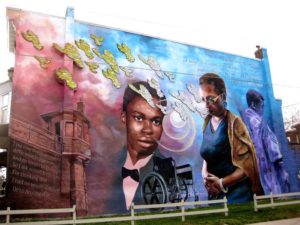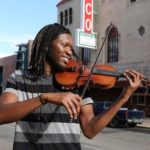Every Ghetto, Every City
by Saddiq Granger
“…every ghetto
made me regret my days in the new Jerusalem.
you know it’s hot
don’t forget what you got
looking back…” – Lauryn Hill
I often hear banter about the trappings of my culture with no idea of the heritage or tradition enshrined in them, or the adaptations made through generations of struggle. I hear comments made with no idea of the beauty and complex symbolism inherent in cultures that can trace their roots to the dawn of time, that hold the oldest creation stories. The story of my culture is the story of humanity, it is the main tree that all branches are believed to have sprung from.
 I am from the “Ghetto” — a word borrowed from the Italians in Venice during a time in which they segregated the living quarters of the Jews — 27th & Berks in Philadelphia to be exact. I’ll provide you with pictures but if you don’t believe me look it up.
I am from the “Ghetto” — a word borrowed from the Italians in Venice during a time in which they segregated the living quarters of the Jews — 27th & Berks in Philadelphia to be exact. I’ll provide you with pictures but if you don’t believe me look it up.
Growing up I realized something. The people I was looking at, everyone around me, they were all asleep. No matter how intelligent, they were they were gone as sure as if they had been snoring. So, as a young bull, I engaged in this period where I thought I was the only one who knew what was going on. As an adult, it sometimes seems like I was right.
This lesson was a milestone for me. I learned that consciousness is a choice, and if you have a choice, you have a question.
I was born in the hood; I am ghetto. I know the commandments: look four ways before crossing the street, never let nobody know how much dough you hold, never let them know your next move, never trust nobody. If you don’t know these then you don’t know my side of town; it’s no East Waco. My neighborhood is called the Bad Lands–also known as City Killadelphia. I come from a hood that depends on the drug trade as its main economic support system. These drugs are chef’d in higher income communities where people can afford supplies and have a working knowledge of chemistry. Then they flip’em in large quantities in our hood where they are then sold back to members of upper class (mostly the Caucasian community) and of course local clients (mostly Black or Latino). This serves a few purposes, one of the most important, in my opinion, being that the negative fallout from drug use and selling is not witnessed in places besides “the hood.”
 Most of my white peers and I don’t have the same cultural norms to use as a frame of reference. I don’t know very many White people who lived in my community; I saw a sea of Black hopelessness and struggle, people who worked hard and got little for it. As a young child the only correlation I could blame it on was to my skin.
Most of my white peers and I don’t have the same cultural norms to use as a frame of reference. I don’t know very many White people who lived in my community; I saw a sea of Black hopelessness and struggle, people who worked hard and got little for it. As a young child the only correlation I could blame it on was to my skin.
My mom is a hard worker, single parent, straight-A college graduate with a medical degree, who has had more jobs than I can count, most of them what we would call a “hustle” to try and support me and make a better life for herself. I watched and learned from her. My entire life my mother has been a force to be reckoned with it seems. I have never seen her bow to nobody. I learned from these early times in my life to be strong because I had to be, to be self-reliant because there would be no one else. I learned the wealth of achievement and success Africans as a people had contributed to the world. I couldn’t reconcile my feelings of remorse for my condition (skin, ghetto) and this deep love I had for myself and my culture and my family who are all hard working and intelligent. It was a conflict for a long time, until I became conscious of the fact that my skin did NOT equal ghetto. Although I could have told you every fact about Black history, Africa, and the state of our “post-racial” society, I felt this longing to escape, a fleeing from myself and the boxes that (I) had come to mean. It was not about hating being Black, but hating being poor and having some intrinsic sense, even then, that the two were connected.
I began to question what it meant to “Be.”
I am, because…… I am, because, it is? Because it happened? Because I did?
What was shaping me? Was it my external world? My home life? At the time I thought it was a universal consciousness, and now I’m pretty sure it is.
 Growing up young gifted and Black in my neighborhood is an experience in isolation. To be and not to be a part of a culture you clearly belong to is an adjustment. It dawns on you slowly that when they look at you, they are not seeing you; that you do not matter. They are seeing your talent, some unspoiled light in a world long gone dark for them. You are their prodigal son, some Black Moses that they silently cry to for release. That dependence — the yearning for release and acceptance — breeds envy and doubt. It causes questions of self-worth, poisons unity. The reality is no one makes it out. No matter how far you run, you can never leave your past.
Growing up young gifted and Black in my neighborhood is an experience in isolation. To be and not to be a part of a culture you clearly belong to is an adjustment. It dawns on you slowly that when they look at you, they are not seeing you; that you do not matter. They are seeing your talent, some unspoiled light in a world long gone dark for them. You are their prodigal son, some Black Moses that they silently cry to for release. That dependence — the yearning for release and acceptance — breeds envy and doubt. It causes questions of self-worth, poisons unity. The reality is no one makes it out. No matter how far you run, you can never leave your past.
Sure you leave the neighborhood and “do better,” but then you catch a few words that put you right back where you came from.
There is this perception across the color line that you pick up on early, it usually sounds something like
“if they would just” or “I don’t see why” or ” why do they have to” and is usually finished by something that should have been left unsaid.
There is a misconception that because we have lived so close for so long, our culture should have assimilated by now. There is a lack of realization that cultures of color — no matter how recent or long ago their immigration — are still different cultures. They are cultures equally as valid as a means of self-expression as White culture, and with drawbacks and failings just like White culture. In my opinion White culture has been enshrined as a story we are fed, so sacred that when presented with new evidence we cling to the old like a leech. I can point to more than a few historical examples. A college history class makes you realize how much of our national his-story is fabricated. But, the dis-value placed on African-American history, art, science, medicine and culture has hurt our communication. It has led to these subjects being regarded as a topic for radicals and rabble rousers.
When’s the last time you read a great Black book?
When your hand goes up in history class you hear, “Why don’t they just learn normal history like everyone else,” or ” not everything is about being Black.”
I chuckle, because it is. I am learning that this skin I’m in means something different to everyone and life presents me with the challenge of proving most of them wrong. I am learning that “normal” history is the result of one people conquering another and selling its own version of events as the only one.
I wrestled with how to present this, about how to make understanding possible, and I felt like understanding would be impossible until we understand the fissure in experience. I felt like no matter how inconvenient, this conversation can’t be put on pause, or halted. I can’t stop being who I am or having my heritage because it would be more convenient to be perceived as something other. Everything I am I owe to the hood, my talent and my skills are all born and bred there. I may have learned the king’s English, the violin, and other skills after, but my childhood in the hood taught me that you are never living for yourself, and all things are temporary. How much of me is still the boy from the projects? Is the difference between me and other young kings opportunity, or is there something special about us few, proud, brave who make it out?
Consciousness comes when you stop looking for a new way to do things and make your own, when you start to question why, why you believe the way you do. Think about the world from your perspective and then shift it slightly until you are viewing yourself from across the room; really give it a shot.
No matter what you do, what you think, or who you know — your actions change you. At the end of the day every experience everyone has ever had has led up to you. Essentially, I am because I exist.
Ase.
 Saddiq Granger is a native Philadelphian, violinist and aspiring community organizer now residing in Waco, Texas.
Saddiq Granger is a native Philadelphian, violinist and aspiring community organizer now residing in Waco, Texas.
The Act Locally Waco blog publishes posts with a connection to these aspirations for Waco. If you are interested in writing for the Act Locally Waco Blog, please email [email protected] for more information.
